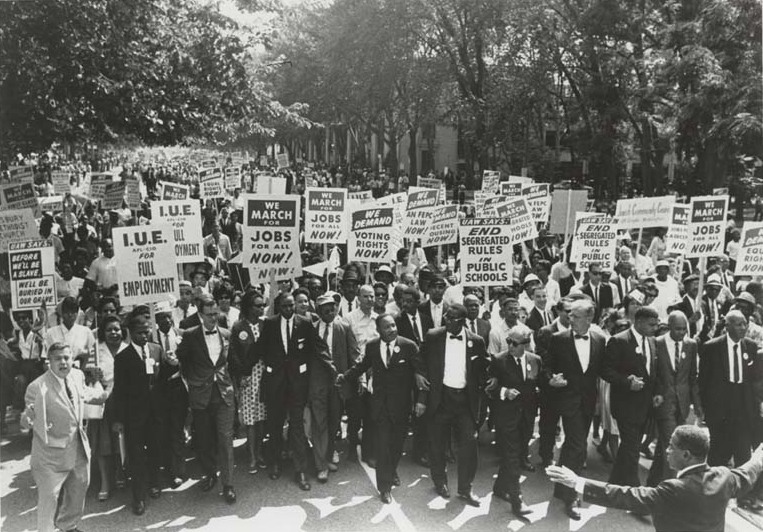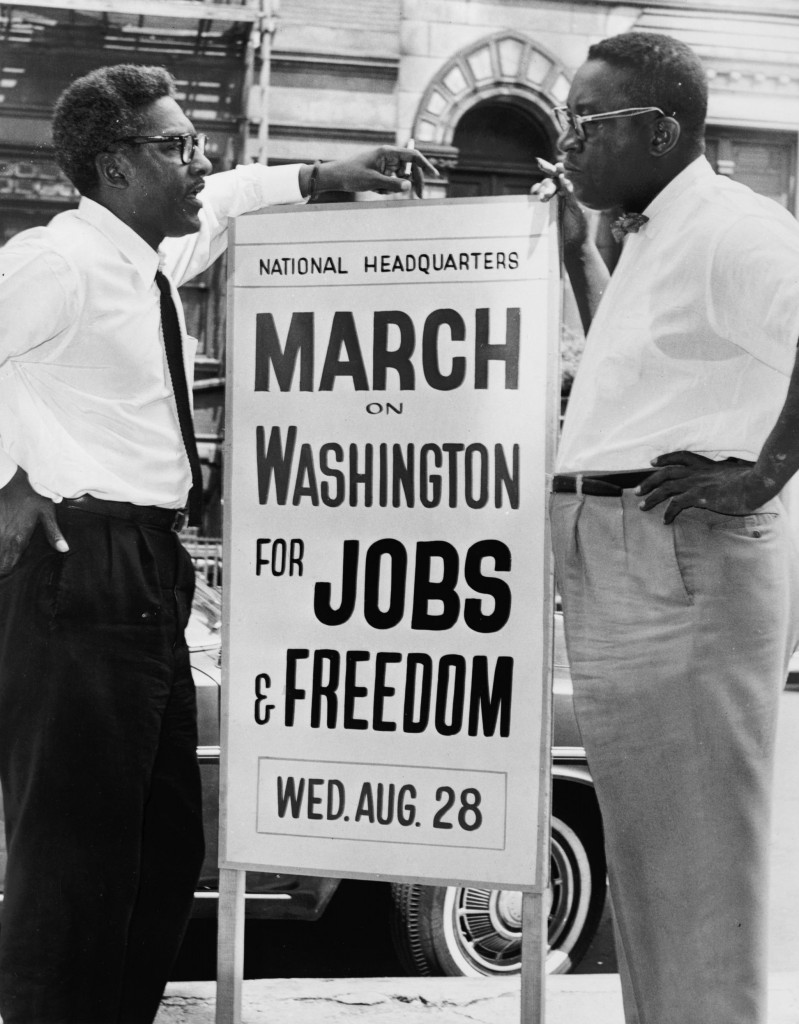Hard boiled-eggs and civil rights

At the head of the march to the mall, on Constitution Avenue. Photographer unknown.
I cannot think about the 1963 March on Washington for Jobs and Freedom without thinking about hard-boiled eggs.
As a 16 year old just about to enter CCNY as a freshman, I was still living with my parents on 24th Street in Manhattan. I had a bus ticket for the ride to Washington that August morning. At 4 am, about to leave the apartment, my mother handed me a brown paper bag with some fruit, bread and two still-warm hard-boiled eggs.
Why have I remembered those eggs all these years–50!–later? That lunch bag got me through hours of bus-riding, followed by hours of walking with tens of thousands of other march participants and then standing for the speeches until we all dispersed to find our buses or cars or trains back to cities and towns far from the nation’s capital.
History books record somewhere between 250,000-300,000 participants. Where was I in that mix? About as far away from the speakers’ podium on the steps of the Lincoln Memorial as one could be: at the other end of the reflecting pool near the Washington Monument.
Why was I there? Not because of my progressive upbringing. Not because friends were going (I only knew one other person on the bus I rode).
I was there because earlier that summer activist Medgar Evers was murdered in Mississippi after President Kennedy delivered a national speech calling for the passage of a Civil Rights Act.
I was there because I had seen images on television during my childhood of young black people being fire-hosed by Southern law officials…because they wanted the right to have a sandwich at a “whites only” lunch counter or they wanted to exercise their right to vote.
I was there because I simply could not believe that in 1963–modern times, with a modern president, in America–people suffered because of the color of their skin.
I was there because I was born the year after WW II ended into a family that had seen its share of losses because of hatred towards Jews. Negroes in America, Jews in Nazi Germany. Definitely connected in my mind.
And, I was there, because I was young and believed we could change the world. For the better.
While great changes did in fact come (the Civil Rights Act was passed months after the march), there was still a long way to go. A few weeks after the march, six little girls died in the bombing of an African-American church in Birmingham, Alabama; a popular President was assassinated just a few months later; less than a year after the march, three young civil rights workers were murdered in Philadelphia, Mississippi; and, so many others were beaten and abused. It was a violent year.
![Some of the leaders of the march, from left: Mathew Ahmann, Executive Director of the National Catholic Conference for Interracial Justice; (seated with glasses) Cleveland Robinson, Chairman of the Demonstration Committee; (standing behind the two chairs) Rabbi Joachim Prinz, President of the American Jewish Congress; (beside Robinson is) A. Philip Randolph, organizer of the demonstration, veteran labor leader who helped to found the Brotherhood of Sleeping Car Porters, American Federation of Labor (AFL), and a former vice president of the American Federation of Labor and Congress of Industrial Organizations (AFL-CIO); (wearing a bow tie and standing beside Prinz is) Joseph Rauh, Jr, a Washington, DC attorney and civil rights, peace, and union activist; John Lewis, Chairman, Student Nonviolent Coordinating Committee; and Floyd McKissick, National Chairman of the Congress of Racial Equality.] Photo: USIA](https://blogs.northcountrypublicradio.org/allin/files/2013/08/march3.jpg)
Some of the leaders of the march, from left:
Mathew Ahmann, Executive Director of the National Catholic Conference for Interracial Justice; (seated with glasses) Cleveland Robinson, Chairman of the Demonstration Committee; (standing behind the two chairs) Rabbi Joachim Prinz, President of the American Jewish Congress; (beside Robinson is) A. Philip Randolph, organizer of the demonstration, veteran labor leader who helped to found the Brotherhood of Sleeping Car Porters, American Federation of Labor (AFL), and a former vice president of the American Federation of Labor and Congress of Industrial Organizations (AFL-CIO); (wearing a bow tie and standing beside Prinz is) Joseph Rauh, Jr, a Washington, DC attorney and civil rights, peace, and union activist; John Lewis, Chairman, Student Nonviolent Coordinating Committee; and Floyd McKissick, National Chairman of the Congress of Racial Equality.] Photo: USIA
We all remember Dr. King’s “I Have a Dream” speech as the enduring soundtrack of the march. But there were others there–leaders who had been working on a march and had been civil rights activists for as long or longer than Dr. King.
Those leaders are worth mentioning as we take note of the 50 year anniversary of the march. Here’s the list from the Wikipedia article on the march:
In June 1963, leaders from several different organizations formed the Council for United Civil Rights Leadership, an umbrella group which would coordinate funds and messaging.[27][28] This coalition of leaders, who became known as the “Big Six“, included: Randolph who was chosen as the titular head of the march, James Farmer (president of the Congress of Racial Equality), John Lewis (chairman of the Student Nonviolent Coordinating Committee), Martin Luther King, Jr. (president of the Southern Christian Leadership Conference),[6] Roy Wilkins (president of the NAACP),[6] and Whitney Young (president of the National Urban League). King in particular had become well known for his role in the Birmingham campaign and for his Letter from Birmingham Jail.[29] Wilkins and Young initially objected to Rustin as a leader for the march, because he was a homosexual, a Communist, and a draft dodger.[24] They eventually accepted Rustin as deputy organizer, on the condition that Randolph act as lead organizer and manage any political fallout.
Less than two years after the march, I would head to Alabama to join the Selma march. And, then, back to NYC–to finish college and to participate in civil rights activities in Harlem (we forget that while the North had no codified “Jim Crow” laws, de facto practices and prejudices pervaded our society).
The March on Washington is a piece of our national history–and my personal history. That personal history of civil rights activism began with two hard-boiled eggs. I rarely eat a hard-boiled egg without a wisp of memory of that morning, August 28, 1963–how different our world was then, how much has changed, and how change can scare and improve us. Thanks, Mom, for the eggs.

Bayard Rustin and Cleveland Robinson. Photo: Orlando Fernandez.









thanks, ellen.
Beautifully written, Ellen. Thanks. And thanks for being there in 1963.